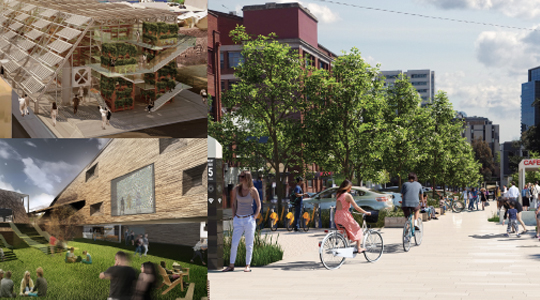Studio 41
Urban Eco Acupuncture
Melbourne Innovation Districts
Dr Michael Trudgeon and Prof Chris Ryan

Studio Description
This semester, VEIL will join forces with the RMIT School of Architecture and Urban Design to deliver a multidisciplinary super studio. The collaboration will focus on developing design proposals and implementation strategies that transform the inner Melbourne urban landscape, incorporating the aspirations of the Melbourne Innovation Districts Project, underpinned by dramatically enhanced sustainable transport supply including three Melbourne Metro Rail Projects (MM1, MM2 and an airport Metro), additions to the tram network, cycling and walking infrastructure.
15 teams will each develop their own project for a nominated site at a range of scales including transport interchanges and new public spaces, through to future forms of living and working spaces. The design proposals will integrate innovative responses centered around public realm, resilient and distributed systems of provision, adaptive reuse, digital infrastructure, spaces in between, future living and education, addressing three main targets:
- Distributed production Systems: Energy and water production and consumption
- Transport: Car-free city by 2030
- Intensification: Accommodating a population of 8 million by 2050.
The teams will then stitch and blend their individual projects to form a combined, considered and holistic masterplan showcasing the potential development and transformation of Melbourne. Here is an opportunity to create a set of vibrant, sustainable urban experiments, a living laboratory to test radical propositions across may scales of intervention from urban design, architecture, landscape architecture to industrial design and service design. There will be an emphasis on physical model making in this studio and we will hold an introductory session in the Fab Lab at MSD. The studio will be taught at MSD on Mondays and with our RMIT collaborators on Wednesday evenings from 5.30pm to 8.30pm at RMIT.
Studio Outcomes
Eco-Acupuncture is a process that supports urban communities to co-develop visions of transformed, low-carbon, resilient futures – in response to the anticipated environmental, social and technical impacts of a changing climate. These are twenty-five year visions of new urban conditions that are then used to design and plan many small interventions in the current environment, as seeds for the development of the transformed futures. The program has operated across thirteen urban projects in Victoria and in Europe since 2008.
Decarbonising the economy and building adaptive capacity to deal with changing climate and extreme weather events is an urgent societal challenge. This is particularly critical for cities where addressing climate challenges requires complex transformation of the existing urban environment and its support infrastructure (energy, water, food, waste, transport). Because cities are complex social and cultural entities, transformation of the physical and technological environment involves the re-framing of urban life, the negotiation of new, desirable patterns of living that are compatible with the altered bio-physical form of the urban environment.
Studio Leaders
Michael Trudgeon has 25 years of experience, as the Design Director at Crowd Productions, in commercial architecture, industrial design and communication design. Built project work ranges from national retail roll-outs and cinema complexes to major exhibition installations and commercial product ranges. Principal experience includes project design and co-ordination across design disciplines, identification of emerging technological opportunities relevant to project work and orchestrating full scale prototyping programs for architectural projects to test and develop design innovation. He is a Professor of Design at the RMIT School and Design, where he has taught since 1983
Chris Ryan has worked for over 30 years across various areas of science, technology, environmental policy and design, and in projects that span the community sector, academia, government and international agencies and business. He helped found the first multi-disciplinary undergraduate socio-environmental degree program at RMIT University that spanned two faculties (Social Science and Architecture and Design). That program ran from 1984 to 1997. He was foundation professor of Design and Sustainability at RMIT from 1990, and Director of the National (Key) Centre for Environmental Design from 1989-98. In this position he directed the National EcoReDesign program, and ARC Linkage and ERDC project, working with 20 Australian companies to develop a new eco-design methodology and bring new greener products into the market. Professor Ryan has collaborated with many eco-design related research groups in Europe, including the Politecnico di Milano, Italy, the Technical University of Delft in the Netherlands and the UK Design Council
Reading & Reference
Niklas Maak. 2015. Living Complex. From Zombie City to the New Communal. Munich, Hirmer.
Horst Rittel and Melvin Webber. 1973. Dilemmas in a General Theory of Planning. Scotland. Policy Sciences 4.
Bruce Katz and Jennifer Bradley. 2013. Metropolitan Revolution. How Cities and Metros are Fixing Our Broken and Fragile Economy. New York. Brookings Institution Press.
Professor Chris Ryan et al. 2016. Scenarios 2040. Results from the second year of Visions and Pathways 2040. Scenarios of Low Carbon Living. Sydney. Low Carbon Living CRC.
ST1/41 Monday 9AM-12, MSD Room 118
ST2/41 Monday 1:15-4:15PM, MSD Room 118
Wednesday 5:30-8:30PM, RMIT